| Web
and Book design,
Copyright, Kellscraft Studio 1999-2024
(Return
to Web
Text-ures)
| Click
Here to return to The Elm Tree Fairy Book Content Page Return to the Previous Chapter |
 (HOME)
|
|
HOW
JACK WON A WIFE
THERE was once a poor farmer lad named Jack, who loved to be
setting snares for rabbits and tramping about the fields and woods after
berries. He liked also to invent funny tricks that annoyed people at first, but
afterward made them laugh. This sort of thing seemed to him a good deal
pleasanter than working, but at last he grew to be a young man, and his father
sent him off to seek his fortune. He left home early in the morning and walked on and on all
day. Toward nightfall the weather turned rainy and presently he sought shelter
at a lonesome little house in the midst of a wood. When he looked in at the
door he saw an old woman sitting by the fire. "Good evening," said the youth, "it is
terrible weather outside tonight." "Indeed it is," the old woman agreed, "and
what is it brings you here?" "I want supper and a bed," he replied. "You can't have them," said she. "What's to hinder me?" he inquired. "The owners of the house," she answered. "They
are six men who are not at home just at present. It may interest you to know
that they are robbers, and so they are out mostly nights; but in the morning
when they come back, if they were to find you here, they'd take your head
off." "Well," said Jack, "I'm not going to catch my
death lying out under a hedge such a night as this. Here I'm going to stay. So
give me something out of the cupboard to eat." 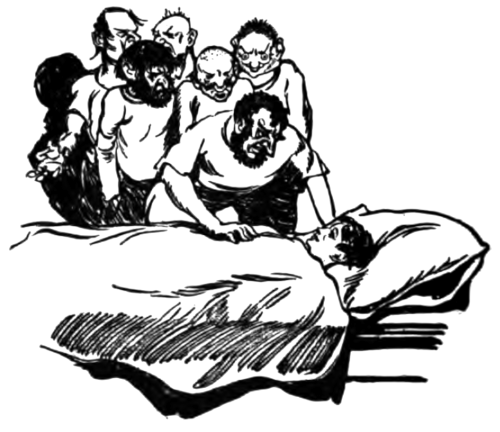 "Who are you?" asked the chief of the group,
"and what's your business?" "I am a master robber," said Jack, "and I am
looking for apprentices to work under me. If you fellows are any good I'll take
you." They were a little startled at this reply, and the head man
said, "Well, get up, and after breakfast we'll find out who is to be the
master." Breakfast was just finished when they noticed a farmer going
along the road driving a fine large goat to market. "Look," said
Jack, "will any of you undertake to steal that goat from the owner before
he gets out of the woods, and that without the slightest violence?" "I couldn't," said one. "I couldn't," echoed each of the others. "I'm your master," said Jack. "Give me a
stout rope and I'll get the goat." They gave him the rope and he ran through the woods till he
got well ahead of the farmer. Then he climbed a big tree that reached out over
the highway and suspended himself by the rope from a limb right above the road.
He had the rope under his arms, but it was concealed beneath his coat so that
anyone glancing hastily might think it was around his neck. Along came the farmer and saw the man hanging from the bough
of the tree. "Lord save us!" he exclaimed, "what a hard lot
yours must have been to make you hang yourself! This is a bad business and I
must run and tell the people at the nearest house and get them to send for the
constable." So he tied his goat to a sapling and hurried off. Jack at
once came down from the tree, took the goat and returned to the robbers' house.
"We didn't think you could do it," said the robbers. "You shall
be our master." Then they showed him the cave where their money was hidden
and swore obedience to him. The next day they asked Jack if they might go to a
fair at a big town about ten miles distant. "Why, yes," said Jack, "go along, and I will
stay here and look after things." So off they went. Then Jack paid a visit to the treasure
cave, filled all his pockets with gold and put on a rich suit of clothes. That
done, he got the goat from the barn and tied to its neck a little bag
containing ten guineas, and drove the creature to the home of its owner. The
farmer and his wife were at the door, and when they saw the goat they clapped
their hands and laughed for joy. "Do you know who owns this beast?" asked Jack. "It is ours," they replied. "I found it in the woods," explained Jack. "Is
that bag with ten guineas in it that's hung from the goat's neck yours?" "Faith, it isn't!" they answered. "Well, you can keep it, at any rate," said Jack.
"I don't want it." "Heaven bless you!" said they. Jack then left them and travelled on till he came to his
father's house. When he arrived it was the dusk of evening. He went in and
said, "God save all here!" "God save you kindly, sir!" his father responded.
"Could I have a night's lodging?" Jack asked. "Oh, sir, our
place isn't fit for the likes of a gentleman such as you!" replied his
father. "Don't you know your own son?" said Jack. His father and the others opened their eyes very wide .then,
and they all jumped to clasp him in their arms. "But, Jack, where did you
get the fine clothes?" they inquired. So he told them all about his adventures, and then they went
to bed. "Father," said Jack the next morning, "go
over to the landlord's house and tell him I wish to marry his daughter." The landlord, or "squire "as he was commonly
called, lived near by, and he had a large house, and so much money he did not
even know how much it was. As for his daughter, she was as good and wise as she
was pretty. Jack's father was reluctant to undertake the young man's errand.
"I'd only be wasting my time," he declared, "and I'm afraid the
squire would set his dogs at me." "Don't be anxious," said Jack. "Tell
him I am a gentleman worth a thousand pounds, all of it taken from the biggest
rogues alive. Tell him how I beat the thieves at their own business and say
that there is not my equal for cleverness in all Britain, and be sure the young
lady is by when you speak of these things." "It's a queer errand you're sending me on," the
father responded, "but I'll go if you say so." In two hours he was back, and Jack asked him, "What
news?" "Droll news enough," the father answered. "The
lady didn't seem a bit unwilling, and I suspect you've spoken to her about the
matter before, but the squire laughed and said if you could, without their
knowledge, take the goose away when it's cooking at their kitchen fire next
Sunday he'd see about your marrying his daughter." The next Sunday, after the people had come home from church,
the squire and all his family were sitting in the kitchen, and the goose was
turning on the spit before the fire. Presently the kitchen door opened and a
miserable old beggar man with a big bag on his back put in his head. "Will
there be anything for me when dinner is over?" said he. "To be sure," the squire replied, "but we
have no room for you in here just now. So sit in the porch for a while." "God bless your honor's family, and yourself!"
responded the beggar. Soon, someone that was sitting near the window cried out,
"Oh, there's a big hare scampering like the mischief across the yard! Shall
we run out and catch it?" "Catch a hare, indeed!" exclaimed the squire.
"Much chance we'd have. No, we'll sit where we are." The hare made its escape into the garden. It had come out of
the beggar's bag, and the beggar was none other than Jack in disguise. Pretty
soon he let loose another hare from his bag. 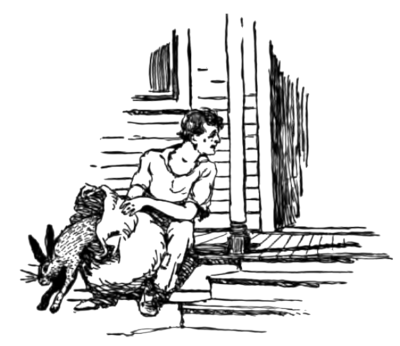 "Stay quiet, I tell you!" commanded the squire. In a little while Jack set free a third hare, and the person
near the window shouted that the hare was still in the yard. Then the family
couldn't be kept indoors any longer. Out they ran every one, the squire
bringing up the rear, and the beggar called after him, "Shall I turn the
spit, your honor, while you're catching the hare?" "Do so!" replied the squire, "and don't let
anyone in on your life." "Faith and I won't," the beggar promised, "you
may depend on it!" The third hare got away after the other two, and when the
family returned from the hunt, hot and tired with their exertions, there was
neither beggar nor goose in the kitchen. Then they knew Jack had got the best
of them, and while they were thinking how they should make out a dinner, a
messenger came from Jack's father begging that the squire, the mistress and the
young lady would step across the fields and dine at his house. So they walked over and ate dinner and there was roast beef
and roast turkey and their own roast goose. The squire had like to have burst
his waistcoat with laughing at the way the goose had been taken; and Jack's
good clothes and good manners did not lessen any liking the young lady already
had for him. Jack accompanied his father's guests when they started for
home, but the squire and his wife soon went on ahead while Jack and the young
lady loitered along together, often stopping to pick flowers or to rest
whenever they could find any excuse for so doing. Shortly after the squire reached his mansion, Father
Lawrence, the priest, called, and the squire told him of the trick Jack had
played. "Well," said the priest, "I don't believe he
could have made a fool of me that way." "Ha!" said the squire, "you'd better look out
for yourself or he'll trick you as badly as he did me." "No danger," responded the priest, and he
continued to laugh and joke the squire for losing his goose so easily. The squire did not enjoy being twitted about the matter, and
pretty soon he went outdoors and left the priest talking with the goodwife.
Jack and the young lady were just approaching, and the squire called to them,
and addressing Jack, said, "See here, Father Lawrence is inside there, and
he has been telling me what a fool I am to have let you take my goose as you
did. Now, couldn't you play off a really good trick on him?" "It wouldn't be very hard to do that," said Jack. So he got a sheet and wrapped it about him and stuck some
goose feathers in his hair and fastened a swan's wing to each shoulder. When
the priest left the squire's in the early dusk of the evening to go home he
went the nearest way, which was by a field path. As soon as Jack saw him
started, he ran roundabout and got ahead of him. Then he climbed into a
maple-tree by the pathside and as the priest drew near began to call, "Father
Lawrence! Father Lawrence!" "Who is wanting me?" asked the priest looking up
into the tree. "I am an angel," replied Jack, "sent to
announce to thee that because of thy piety thou shalt be taken away alive into
heaven. Hold thyself in readiness to go there with me next week Monday night,
for then I will come to fetch thee and bear thee away with me in a sack." Father Lawrence fell down on his knees before the angel and
thanked him, and the following Sunday he preached a farewell sermon, and said
an angel had appeared to him and announced that because of his righteousness he
should be taken up alive into heaven. As he told his hearers this, every one in
the church, old and young, wept, for they expected never to see him again. On the appointed evening Jack came to the priest's house
clad once more as an angel, and the priest bowed low before him and bade him
welcome. Then the priest got into the sack that Jack had brought, and Jack tied
it up tight and dragged it away over the stubble and stones toward the squire's
house. "Oh, oh!" cried the priest in the sack, "where
are you taking me?" "The way to heaven is not an easy one," replied
Jack, and continued to drag him along. So, when the route was rough, the priest fancied they were
going over the mountains, and when the bag bounced into a puddle, he thought
they were passing through a cloud. At last Jack reached the squire's and flung his burden into
the goose-house, where the geese began to hiss and peck at the kicking thing
inside of the sack. "Oh, oh, oh!" screamed the priest, "where am
I now?" "You are in purgatory," Jack answered, and off he
went. Next morning when the goose-girl came to let out the geese
she heard the priest as he lay bemoaning himself in the bag. "Mercy! who
is that, and what ails you?" said she. 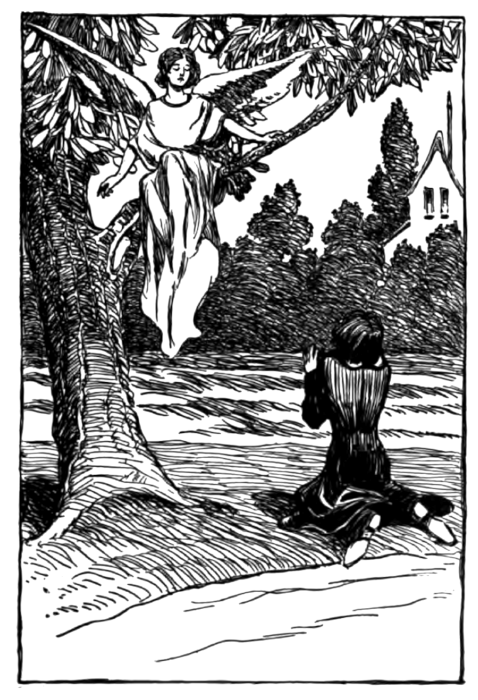 Father Lawrence and the Angel "Oh!" exclaimed the priest, "if you are an
angel from heaven, do let me out of this sack and allow me to go back to the
earth, for no place was ever so bad as this. The little fiends are all the time
nipping me with their tongs." 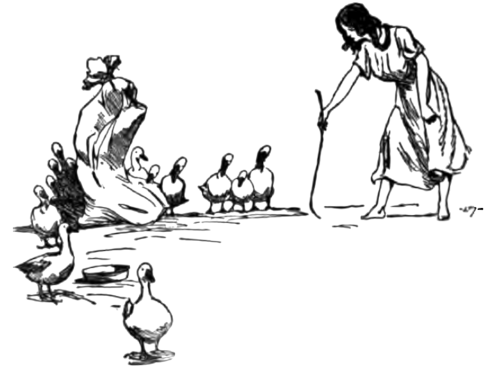 "I am no angel," responded the girl, helping the
priest out of the sack. "I only look after the squire's geese, and it is
they who are the little fiends which have pinched your reverence." "This is Jack's doing!" declared the priest.
"Ah, how bruised and lame I am! and oh, my best clothes!" Wild with rage, he ran off home so fast that the goose-girl
thought he had suddenly gone mad. When the squire learned what had happened to the priest he
laughed heartily, and he was more inclined than he had been before to let Jack
marry his daughter. However, he wanted to try the lad's skill again, and he
said to him, "I have six horses in my stable, and to-night I will have six
stable-boys with them, one on each horse. If you are clever enough to take the
horses from under them I will see what I can do for you." That afternoon Jack made some cakes and put a sleeping
powder into each and baked them. Afterward, by fair words and good payment, he
secured a ragged gown and shawl from an old woman of the neighborhood. These he
put on when evening came, and with a staff in his hand hobbled off to the
squire's stable. The stable boys were just taking in the horses from watering
them. "What do you want here?" one of them asked the old woman. "Oh dear! How cold it is!" said she, shivering and
drawing her shawl tighter about her. "This weather is enough to freeze a
poor old body to death. I beg you to give me leave to stay here and sit just
inside the stable door." "You shall do nothing of the kind," the fellow
declared. "Be off this moment! If the squire were to catch sight of you
here we should be in trouble with him right off." "She's a helpless old creature," remarked-another,
who felt sorry for her. "Surely, she can do no one any harm. Let her come
in." The rest of them thought she ought not to stay, but while
they were disputing over the matter and looking after the horses, she crept
into the stable. Down she sat behind the door, and, now that she was inside,
the stable-boys took no more notice of her. As the night wore on they found it
rather tiresome work to sit on horseback. "Whew! it is dreadfully
cold!" said one, and began to beat his arms backward and forward across
his breast. "Yes, I am so cold my teeth are chattering," said
another. "I am getting hungry," announced a third. Just then the old woman took out a few of her cakes and
commenced eating them, but those she ate were some extra ones that did not have
the sleeping powders in them. "What is it you have there, old woman?" asked one
of the stable-boys. "Some nice sweet cakes," she replied, "and as
I have a bag full I'd offer to share them with you, only you might think it too
free-making." "Oh, bother the pride!" said one. "We'll take
the cakes and thank you." Then the six stable-boys leaped off their horses and
gathered about the old woman. "It's myself that's glad to show how I value your
kindness in giving me shelter," said she, as she handed them the cakes. In a few minutes they were all sound asleep and Jack flung
off his beggar's rags and took one stable-boy after another and gently set him
astride on the partitions which divided the stalls. That done he led forth the
squire's six horses and went off with them. At dawn, the next morning, when the squire came out to look
after his stable-boys, they were just beginning to awake, and they were
thrusting their spurs into the partitions till the splinters flew, and some of
the boys fell off. "Ah, well," said the squire, "it is easy to
see who has been here. But what a worthless set of fellows you must be to let
Jack take the horses from under you!" Later in the day Jack came riding up the avenue, and there
were five horses stepping along behind the one he rode. The horses were sent to
the stable, and Jack was invited into the house where he told the squire and
his family the story of his doings on the preceding night. "After all," the squire remarked to Jack, "it
was no great matter to outwit those numskulls. You must do one thing more, and
if you succeed, you shall marry my daughter." "I would do anything in my power, even for a pleasant
look from the young lady," responded Jack, and the young lady, who stood
by listening, blushed as red as fire. 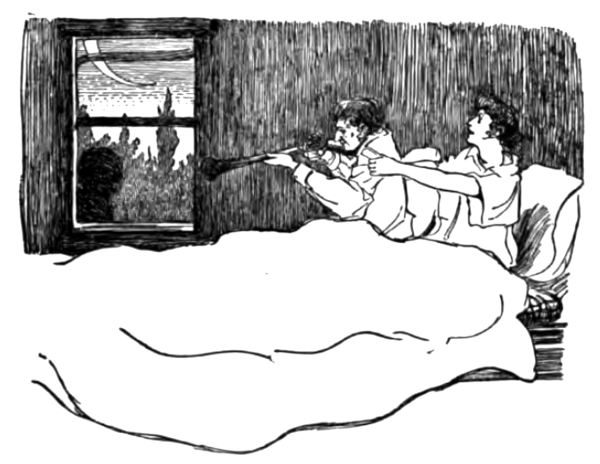 "But you'll find what I ask this time a little too much
even for such a clever chap as you," said the squire. "The thing you
must do is to take away a sheet to-night off the bed I sleep in; and, mind you,
I am going to have my gun with me, and the task will be no joke." "All the same, I'll try," said Jack. Night came, and the squire and his wife were in bed, and the
moon was shining in through the window. At last they saw a head rising over the
sill to have a peep, and then it bobbed down again. "That's Jack,"
whispered the squire. "I'll astonish him a bit," and he picked up his
gun and took aim. "My dear," said his wife, laying a restraining
hand on his arm, "you surely wouldn't shoot the fellow." "Indeed and I wouldn't," replied the squire.
"The gun has nothing but powder in it." Up came the head, and bang went the gun. Immediately there
was a yell of pain and the sound of a body falling with a dull thud on the
gravel walk below the window. Then all was still. "Oh, Lord," cried the lady, "the gun was
loaded after all. Poor Jack is killed or disabled for life." "I hope not," said the squire, and up he jumped
and ran downstairs and out of the door, but this door was on the opposite side
of the house from the window of the sleeping-room. In a few moments his wife heard his voice at the window,
which was partially open. "Wife, wife," said he, "give me a
sheet from the bed at once. He is not killed, I think, but I must have a sheet
to bind up the wound. Be quick with it, for I want to go and get someone to
help carry him in." She pulled the sheet from the bed in all haste and threw it
out to him. Then she put out her head to see what was going on, but he was
gone, and there lay the body uncared for on the ground. While she was
collecting her wits, she saw her husband coming around the corner of the house.
He ran to the body and picked it up. It was nothing but a man's clothes stuffed
with straw and a couple of stones. "And what did you want with the sheet just now to bind
the wound, if he was only a man of straw?" inquired the squire's wife. "Sheet, woman!" the squire exclaimed. "Nonsense,
I wanted no sheet!" "Well," said she, "whether you wanted it or
not, I threw it to you, and you were standing just outside the window." "Oh, Jack has fooled us again!" cried the squire;
"and it was he who put up all that tangle of strings I have been
struggling through on the other side of the house. But for that I would have
been here long ago. Wife, we must have that marriage to-morrow to keep
ourselves out of trouble, if for nothing else." Thus it came to pass that Jack married the squire's
daughter, and, so far as I know, they lived happily ever after. |